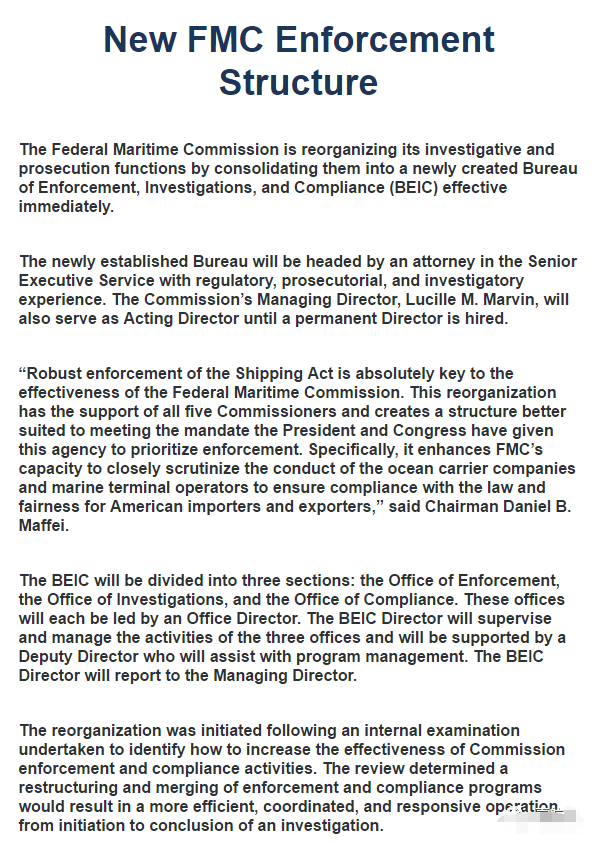Like the Marine industry, which was pushed to the edge of the wind during the epidemic!
The U.S. Federal Maritime Commission (FMC), which is in charge of implementing OSRA, a new shipping reform bill that Biden personally pushed for, has taken new actions.
On Monday (Aug 1), the Federal Maritime Commission (FMC) set up a new division called the Enforcement, Investigation and Compliance Bureau (BEIC) to target container liner companies and terminal operators.

"The new bureau will be led by a senior executive branch attorney with regulatory, prosecutorial and investigative experience," the FMC said in a statement. Lucille M. Marvin, the Committee's Managing Director, will also serve as Acting Director until a permanent director is appointed.
"Strong enforcement of shipping laws is absolutely critical to the effectiveness of the Federal Maritime Commission. The reorganization was supported by all five commissioners and created a structure better suited to meet the priorities the president and Congress have given the agency to perform. Specifically, it enhances FMC's ability to closely scrutinize the actions of Marine carriers and Marine terminal operators to ensure that U.S. importers and exporters are complying with the law and being fair, "said Chairman Daniel B. Maffei.
The BEIC will be divided into three parts: the Office of Enforcement, the Office of Investigations and the Office of Compliance. These offices will be headed by the Chief of staff. The BEIC Director will oversee and manage the activities of the three offices, supported by a Deputy Director assisting with project management; BEIC directors will report to the Managing Director.

The reorganization was initiated following an internal inspection to determine how to improve the effectiveness of the Commission's enforcement and compliance activities. The review determined that the reorganization and consolidation of enforcement and compliance programs would result in more effective, coordinated, and responsive actions from the beginning to the end of investigations.
As part of the reorganization, the commission is transforming the position of district representatives into investigators, placing them in the Office of Investigations. In addition, the Commission will increase the number of its investigators among the staff. Investigators will now focus on enforcement activities, and public outreach functions previously handled by district representatives will be handled by the commission's Office of Consumer Affairs and Dispute Resolution Services as part of its broader public assistance work.
New provisions added to the Marine Transport Reform Act:
1. Shift the burden of proof regarding demurries or the reasonableness of demurries from the shippers to the shipping company;
2. Shipping companies are prohibited from unreasonably reducing the capacity and shipping space of U.S. exports;
3. Shipping companies are required to report to FMC on a quarterly basis the gross tonnage and TEUs (loaded/unloaded) of each vessel calling at a US port;
4. Create new authority for FMC to register shipping exchanges;
5. Study best practices for intermodal chassis tanks to address chassis supply and positioning issues;
6. Prohibit shipping companies from unreasonably reducing shipping opportunities for U.S. exports, as determined by FMC in the new rulemaking;
7. Reprisals against shippers or threats of rejection are prohibited.
"The new Act enhances FMC's ability to closely scrutinize the actions of shipping companies and Marine terminal operators to ensure that U.S. importers and exporters are complying with the law and being fair," added Daniel B. Maffei.
There is a growing consensus that shipping companies benefit from a unique combination of protection and an unusual lack of competition oversight.
Post time: Aug-05-2022